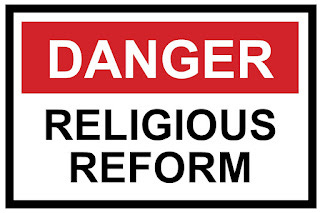Top 5 Dangerous Reforms in Orthodox Judaism

There is a popular myth that Orthodox (and specifically charedi) Judaism represents a basically unaltered approach to Torah and Judaism that has been in existence since Sinai. In fact, it has undergone all kinds of transformations. Some of these are beneficial responses to a changing world; others are relatively harmless. But there are some innovations which might have been driven by good intentions, but have catastrophic consequences.
There is a long list of such harmful innovations, such as the evolution of expensive "requirements" for getting married, the removal of pictures and names of women, and the replacement of various spiritual and material work by segulos. Some of these reforms pose a serious threat to society as a whole. Here, in ascending order, is my view of the most dangerous reforms that have arisen:
5) The notion that material endeavor has no real significance
In traditional Judaism, while God always had the ability to control things and intervene, our material endeavor had genuine significance. But recently, the idea evolved that there is no cause-and-effect in the physical world, that everything is solely dictated by spiritual merit. Accordingly, this meant that people perceive such things as work and army duty as a charade that has no real significance and is merely a "price" that must be paid for maintaining an illusion. Aside from the logical and empirical problems with this approach, it inevitably has the effect of people not taking worldly effort seriously. (For more on this, see my post The Soldiers Are Really Doing Stuff)
4) The creation of "Daas Torah"
While rabbinic counsel was always part of Judaism, traditionally it was valued insofar as it reflected wisdom - the Sages observed that a Torah scholar could lack wisdom and be "worse than a rotten carcass." Furthermore, rabbinic counsel was valued in accordance with it reflecting knowledge - both of the world, and of systems of thought. The modern concept of Daas Torah inverts that, and proclaims that knowledge of Torah (even just Talmud) automatically produces wisdom. It further states that the ultimate guidance (which is considered tdaco be binding) comes from those who are the most isolated from general knowledge of the world. (For more on this, see my monograph The Making of Haredim)
3) The redefinition of Torah Lishma
For Chazal and the Rishonim, "Torah Lishma" was the opposite of Torah Shelo Lishma. It meant that rather than learning for the sake of glory, one was learning for the right reasons - primarily, knowing how to be a good Jew. But when R. Chaim of Volozhin wanted to counter the chassidic notion that Judaism is exclusively about spiritual closeness to God, he reframed the concept of Torah Lishma to mean learning Torah as an end unto itself. Rav Chaim may well be rolling in his grave at where this led. With the rise of the welfare state, this led to an ever-growing community who believe that they are being good Jews and contributing to society by learning in kollel and living off the rest of society, even while they are causing tremendous damage to Israel's economy. (For more on this, see my book Rationalism vs. Mysticism)
2) The idea that the reward for mitzvot can be transferred to anyone
In classical Judaism, the merit for mitzvot is accrued to those who perform them (and to their ancestors who made them into such people); there was simply no mechanism by which someone could choose to transfer it to somebody else. But in the 19th century, the idea evolved that you can choose to transfer the merit for mitzvot to whomever you want. This innocent-sounding idea made a dangerous combination with the previous innovation about Torah Lishma. It enabled those who do not contribute to the economy to convince people to give them money, on the grounds that they are allegedly providing a service for they or their loved ones by learning Torah or doing mitzvot on their behalf. (For more on this, see the chapter "What Can One Do For Someone Who Has Passed Away?" in my book Rationalism vs. Mysticism)
And finally, the most dangerous by far of all the reforms in Orthodox Judaism:
1) The devaluing of self-sufficiency
Classical Judaism maintained (as does every other culture in the world) that self-sufficiency is important. Chazal stated that it is better to engage in a lowly trade than rely on communal support. They extolled the value of work. They said that it is obligatory for parents to raise their children with the ability to provide for themselves. Modern charedi society, on the other hand, has thrown that out of the window. It is considered perfectly acceptable and even an ideal to be supported by others, and to raise one's children without the education or ability to earn a living. While that was manageable when the charedi community was small, it now creates ever-increasing harm to the State of Israel and is actually an existential threat.
(If you'd like to subscribe to this blog via email, use the form on the right of the page, or send me an email and I will add you.)


